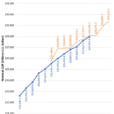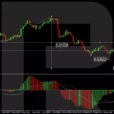The NYT had an article this morning on how European tech start-ups were seeing new capital dry up in the same way as Silicon Valley firms. The piece portrayed this as largely a negative event. Undoubtedly it is bad news for the founders and top employees of these firms, but it’s not clear it is bad news for the economy.
The huge capitalizations of many start-ups has allowed a small number of people to get very rich, however it is not clear that their valuations bore any resemblance to their value to the economy. For example, both Groupon and Dropbox at one point had market capitalizations of more than $10 billion.
While selling coupons over the web and an efficient offsite Internet storage system are both items that will provide benefits to many individuals, so is combining peanut butter and jelly in a single jar. It is not clear that we should expect to see someone becoming a billionaire for coming with the idea of combining peanut butter and jelly in one jar, nor is obvious that the contributions of many of these start-ups should cause people to become billionaires.
If capital markets are hugely overpricing start-ups relative to their actual value to the economy, as subsequently determined by the market, then they are effectively redistributing wealth from others to the leading actors in these start-ups. Insofar as the money is coming from other wealthy people, this is simply a matter of money going from the old rich to newly created rich. In this case, it need not be matter of concern for the rest of us. However if pension fund assets or money held in mutual funds through individual retirement accounts are going into over-valued start-ups, then this is a redistribution from the rest of us to the new rich.
Insofar as that is the story of the Silicon Valley boom and the parallel boom in Europe, we should applaud the collapse of the price of these companies’ stock. An over-valued stock price has the same impact on the economy as counterfeit money that passes for real. It gives some individuals purchasing power who should not have a claim to it. Catching the counterfeiter and bringing the stock price back in line with the fundamentals is good news. (Of course in an economy that is operating below its capacity like ours, we actually would benefit from the demand that would be generated by a successful counterfeiter, bit that is another story.)











Leave A Comment